2024届高考英语形容词副词课件(共32张PPT)
文档属性
| 名称 | 2024届高考英语形容词副词课件(共32张PPT) |  | |
| 格式 | pptx | ||
| 文件大小 | 662.0KB | ||
| 资源类型 | 教案 | ||
| 版本资源 | 通用版 | ||
| 科目 | 英语 | ||
| 更新时间 | 2024-02-11 18:36:37 | ||
图片预览

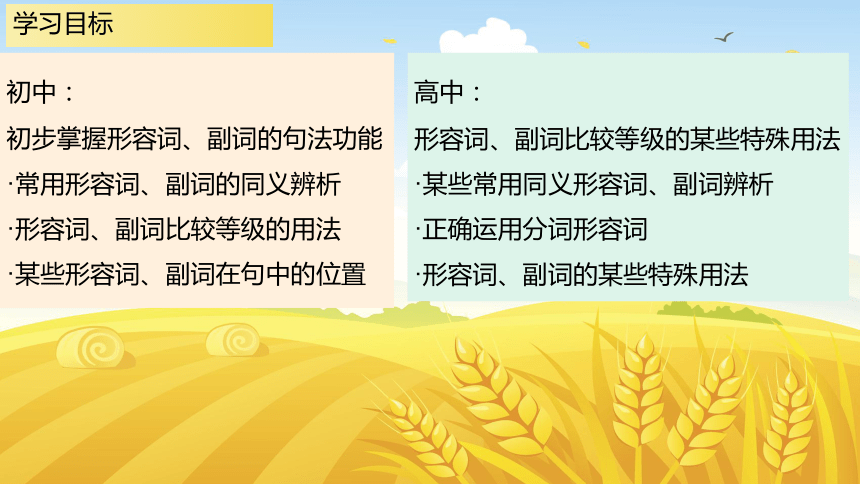

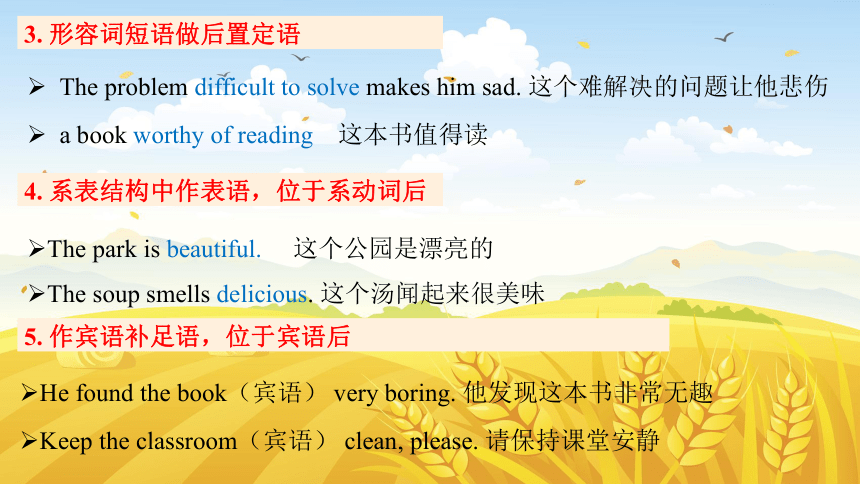
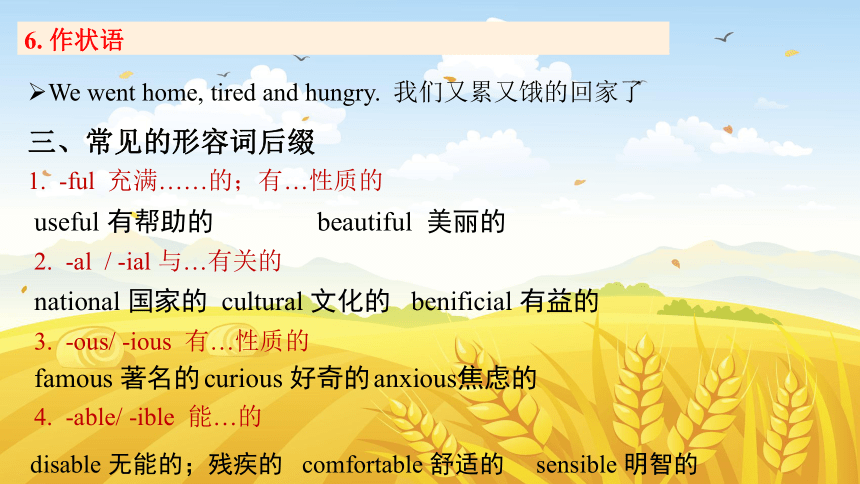
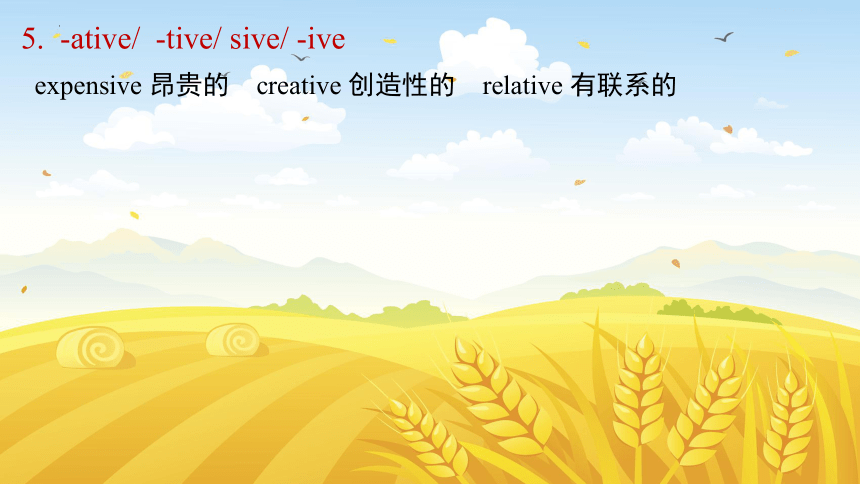
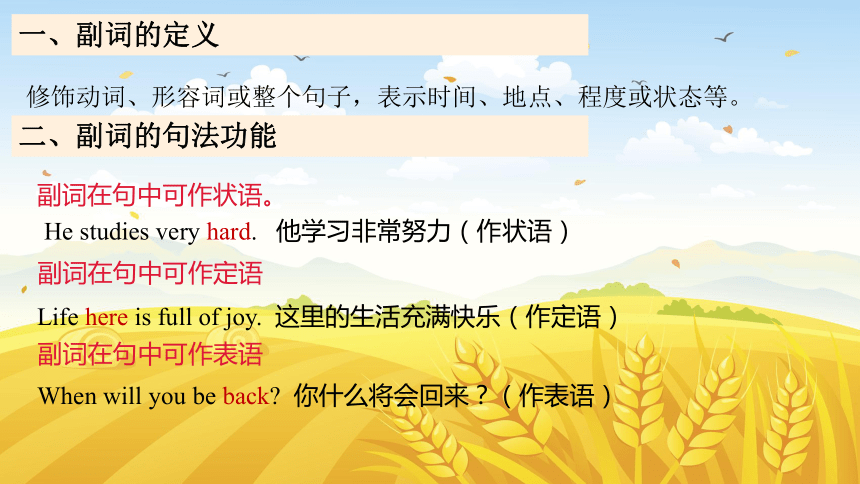

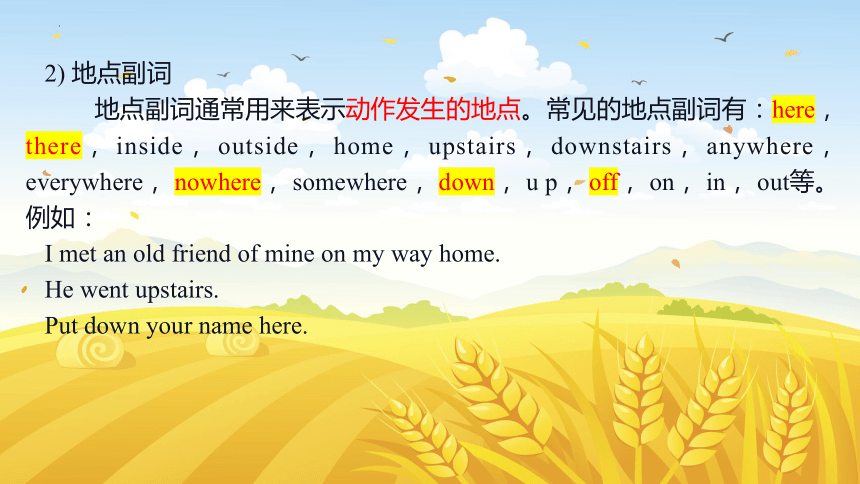
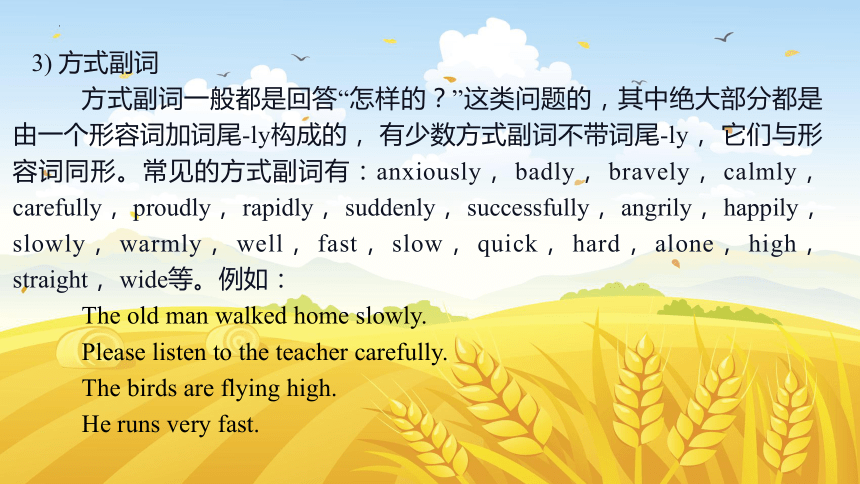
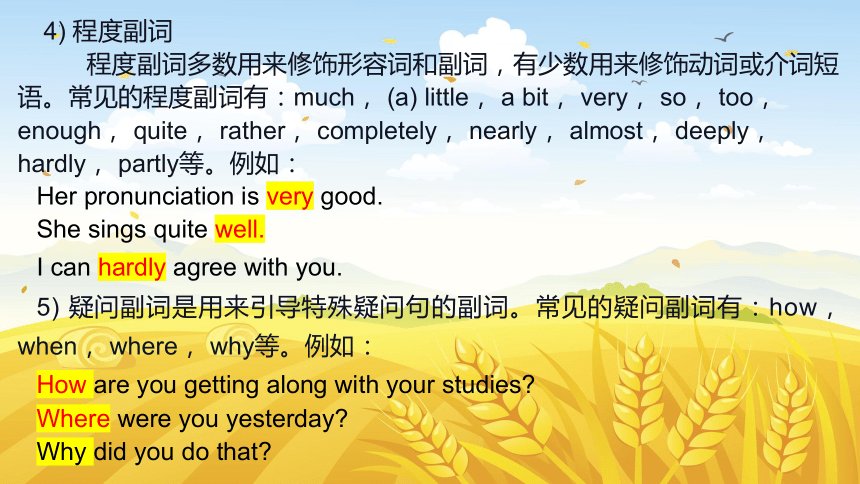
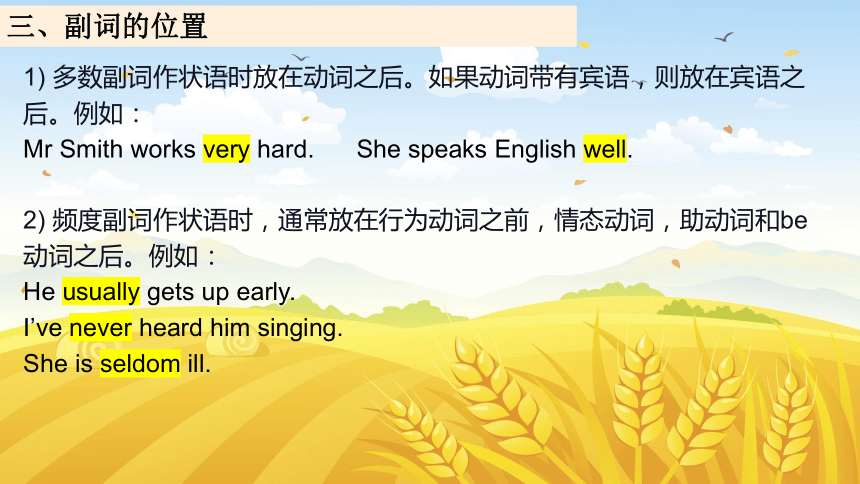
文档简介
(共32张PPT)
形容词副词语法专题复习
学习目标
初中:
初步掌握形容词、副词的句法功能
·常用形容词、副词的同义辨析
·形容词、副词比较等级的用法
·某些形容词、副词在句中的位置
高中:
形容词、副词比较等级的某些特殊用法
·某些常用同义形容词、副词辨析
·正确运用分词形容词
·形容词、副词的某些特殊用法
一、形容词的定义
修饰名词或代词,说明人或事物的性质、状态或特征的词。
二、形容词的句法功能
1. 做前置定语,修饰名词
She is a beautiful girl.
2. 做后置定语,修饰由some,any,every,no等构成的不定代词,形容词后置
I have something important to tell you. 我有重要的事告诉你
Is there anything interesting in the film?在这部电影里有一些有趣的事吗
3. 形容词短语做后置定语
The problem difficult to solve makes him sad. 这个难解决的问题让他悲伤
a book worthy of reading 这本书值得读
4. 系表结构中作表语,位于系动词后
The park is beautiful. 这个公园是漂亮的
The soup smells delicious. 这个汤闻起来很美味
5. 作宾语补足语,位于宾语后
He found the book(宾语) very boring. 他发现这本书非常无趣
Keep the classroom(宾语) clean, please. 请保持课堂安静
6. 作状语
We went home, tired and hungry. 我们又累又饿的回家了
三、常见的形容词后缀
1. -ful 充满……的;有…性质的
useful 有帮助的 beautiful 美丽的
2. -al / -ial 与…有关的
national 国家的 cultural 文化的 benificial 有益的
3. -ous/ -ious 有…性质的
famous 著名的 curious 好奇的 anxious焦虑的
4. -able/ -ible 能…的
disable 无能的;残疾的 comfortable 舒适的 sensible 明智的
5. -ative/ -tive/ sive/ -ive
expensive 昂贵的 creative 创造性的 relative 有联系的
一、副词的定义
修饰动词、形容词或整个句子,表示时间、地点、程度或状态等。
He studies very hard. 他学习非常努力(作状语)
二、副词的句法功能
When will you be back 你什么将会回来?(作表语)
副词在句中可作定语
Life here is full of joy. 这里的生活充满快乐(作定语)
副词在句中可作表语
副词在句中可作状语。
1) 时间副词
时间副词通常用来表示动作的时间。常见的时间副词有:now today, tomorrow, yesterday, before, late, early, never, seldom, sometimes , often, usually, always等。例如:
He often comes to school late.
What are we going to do tomorrow
He is never been to Beijing.
三、副词的分类
2) 地点副词
地点副词通常用来表示动作发生的地点。常见的地点副词有:here, there, inside, outside, home, upstairs, downstairs, anywhere, everywhere, nowhere, somewhere, down, u p, off, on, in, out等。例如:
I met an old friend of mine on my way home.
He went upstairs.
Put down your name here.
3) 方式副词
方式副词一般都是回答“怎样的?”这类问题的,其中绝大部分都是由一个形容词加词尾-ly构成的, 有少数方式副词不带词尾-ly, 它们与形容词同形。常见的方式副词有:anxiously, badly, bravely, calmly, carefully, proudly, rapidly, suddenly, successfully, angrily, happily, slowly, warmly, well, fast, slow, quick, hard, alone, high, straight, wide等。例如:
The old man walked home slowly.
Please listen to the teacher carefully.
The birds are flying high.
He runs very fast.
4) 程度副词
程度副词多数用来修饰形容词和副词,有少数用来修饰动词或介词短语。常见的程度副词有:much, (a) little, a bit, very, so, too, enough, quite, rather, completely, nearly, almost, deeply, hardly, partly等。例如:
Her pronunciation is very good.
She sings quite well.
I can hardly agree with you.
5) 疑问副词是用来引导特殊疑问句的副词。常见的疑问副词有:how, when, where, why等。例如:
How are you getting along with your studies
Where were you yesterday
Why did you do that
三、副词的位置
1) 多数副词作状语时放在动词之后。如果动词带有宾语,则放在宾语之后。例如:
Mr Smith works very hard. She speaks English well.
2) 频度副词作状语时,通常放在行为动词之前,情态动词,助动词和be动词之后。例如:
He usually gets up early.
I’ve never heard him singing.
She is seldom ill.
3)程度副词一般放在所修饰的形容词和副词的前面, 但enough作副词用时,通常放在被修饰词的后面。例如:
It is a rather difficult job.
He runs very fast.
He didn’t work hard enough.
四、部分常用副词的用法
1) very, much
这两个副词都可表示“很”,但用法不同。
Very用来修饰形容词和副词的原级,而much用来修饰形容词和副词的比较级。例如:
She is a very nice girl I’m feeling much better now.
Much可以修饰动词,而very则不能。例如:
I don’t like the idea much.
They did not talk much.
2) too, either
这两个副词都表示“也”,但too用于肯定句,either用于否定句。例如:
She can dance, and I can dance, too.
I haven’t read the book and my brother hasn’t either.
3) already, yet
already一般用于肯定句,yet一般用于否定句或疑问句。例如:
He has already left.
Have you heard from him yet
He hasn’t answered yet.
比较级+最高级
一、变化规则
情况 比较级 最高级
大部分形容词/副词
辅加y结尾
以重读闭音节结尾且末尾只有一个辅音字母
多音节词 和部分双音节词
直接加-er
直接加-est
变y为i加-er
变y为i加-est
双写辅音字母加-er
双写辅音字母加-est
在原级前加
more
在原级前加the most
二、不规则变化
原级 比较级 最高级
good/well better best
bad/ill/badly worse worst
little less least
many/much more most
原级 比较级 最高级
good
bad
quick
big
far
few
little
wide
heavy
good
better
best
bad
worse
worst
quick
quicker
quickest
big
bigger
biggest
far
farther
further
farthest
furthest
few
fewer
fewest
little
less
least
wide
wider
widest
heavy
heavier
heaviest
三、比较级用法
1. 比较级+ than
Tom is taller than Lily.
He is more handsome than Tom.
2. more and more+原级 越来越多
the +比较级, the +比较级 “越…,越…”
The more you eat,the fatter you will be.
The higher you stand,the farther you will see.
3. most 同形容词连用而不用 the,表示 ”极,很,非常, 十分”。
It‘s most dangerous to be here.
在这儿太危险。
4. the + 形容词,表示某种人。
He always helps the poor 他总是帮助穷人.
5. 原级比较
as+ adj/ adv + as 和…一样
Tom is as tall as Jerry.
Tom runs as fast as Lily. (fast是副词,表示跑的程度)
They must find out the new information as quickly as possible.他们必须马上查明新情况。
四、最高级用法
1. the +最高级+ in/of … 在…中最…
He is the tallest boy in the class.
2.one of+ 最高级+可数名词复数,最…之一
Yuan Longpin is the most famous scientists in the world.
高中考点衔接
一、后置定语的形容词
2.某些以-ible或-able结尾的形容词作定语可前置也可后置,但当这些词所修饰的名词前有形容词最高级或only修饰时,必须后置
I doubt whether we can complete our contract in the time available.
(=I doubt whether we can complete our contract in the available time.)
我不确定我们是否能在现有的时间内
That is the greatest difficulty imaginable.那是能想象得到的最大困难。
这类形容词常见的有:acceptable、adaptable、available、imaginable、possible、suitable 等。
1.某些以a开头的形容词(表语形容词)作定语必须后置
She was the only person awake at the moment.她是那时唯一醒着的人。
这类形容词常见的有alike,alive,alone,afraid,awake,aware,alight,afloat,asleep等。
3.形容词短语作定语一般后置,相当于一个省略了关系代词和连系动词的定语从句。
如:Aperson (who is) so difficult to please(形容词短语) must be hard to work with.
一个如此难以取悦的人,一定很难共事。
二、形容词、副词表示倍数的句型
1.倍数+as+形容词/副词原级+as·
2.倍数+形容词/副词比较级+than···
At a rough estimate, Nigeria is threetimes as big as Great Britain.
=At a rough estimate, Nigeria is threetimes bigger than Great Britain.
粗略估算,尼日利亚的面积是大不列颠的3倍。
I.单句语法填空
1.All of a (suddenly),a piercingscream broke the silence when everyone was asleep.
2.In those days, bikes were not (wide) rode because few people couldbuy one.
3. The project isn't difficult. You can finish it (easy).
4. The soup was too (salt) be-cause I put too much salt in it.
5.She said nothing and always kept (silence) during the meeting
sudden
widely
easily
salt
silent
6.Among the four seas off the coast of China,East China Sea is the second (deep).
7. The Dragon Boat Festival is an importantday in our country. On that day we can have some (tradition) food like“Zongzi”.
8.Emma looked after her pet dog (careful) of all her friends.
deepest
traditional
the most carefully
II.完成句子
1. ,Li Ming or WaWang Tao
谁比较高,李明还是王涛?
2.It's getting in spring.
春天天气变得越来越暖和了。
3. Amanda read the article ,and found in it.
阿曼达仔细阅读了这篇文章,发现了其中的一些重要内容。
4.The teacher gave us today.
今天老师给我们留下太多的作业。
5.Is it cheaper and enjoyable to travel by train than by plane 坐火车旅行比坐飞机便宜多了,而且愉快得多吗?
6.This kind of sweaters look and sell .
这种款式的毛衣看起来挺好看而且卖得也很好。
Who is taller
warmer and warmer
carefully enough
something important
too much homework
much
far more
beautiful
well
III.语篇填空(根据提示或句意填空)
Some people think that they will get ill if they use their brains much. It is not true.
Through many studies,scientists show us that the (much)you use your brain,the better it will be and the (clever) you will be-come.
Of course,if you want to keep your mind (clearly) and active,you must take aproper rest and study (proper). To the teenagers,using their brains in the morning is (well) for their health.There are many ways to rest. One is a (peace) rest.Sleep is a peaceful rest.An-other is an (act) rest.For example,takea walk (outdoor) and do more exerciseevery day.To change the way of brains' activities is also a good way to rest.
In everyday life,to eat some eggs, meat,fresh vegetables and fruit is also good for thebrains.
Wish you a wise man and a (happily) life.
1.too 2.more 3.cleverer 4.clear 5.properly 6.good
7.peaceful 8.active 9.outdoors 10.happy
课程结束
授课老师:0377
形容词副词语法专题复习
学习目标
初中:
初步掌握形容词、副词的句法功能
·常用形容词、副词的同义辨析
·形容词、副词比较等级的用法
·某些形容词、副词在句中的位置
高中:
形容词、副词比较等级的某些特殊用法
·某些常用同义形容词、副词辨析
·正确运用分词形容词
·形容词、副词的某些特殊用法
一、形容词的定义
修饰名词或代词,说明人或事物的性质、状态或特征的词。
二、形容词的句法功能
1. 做前置定语,修饰名词
She is a beautiful girl.
2. 做后置定语,修饰由some,any,every,no等构成的不定代词,形容词后置
I have something important to tell you. 我有重要的事告诉你
Is there anything interesting in the film?在这部电影里有一些有趣的事吗
3. 形容词短语做后置定语
The problem difficult to solve makes him sad. 这个难解决的问题让他悲伤
a book worthy of reading 这本书值得读
4. 系表结构中作表语,位于系动词后
The park is beautiful. 这个公园是漂亮的
The soup smells delicious. 这个汤闻起来很美味
5. 作宾语补足语,位于宾语后
He found the book(宾语) very boring. 他发现这本书非常无趣
Keep the classroom(宾语) clean, please. 请保持课堂安静
6. 作状语
We went home, tired and hungry. 我们又累又饿的回家了
三、常见的形容词后缀
1. -ful 充满……的;有…性质的
useful 有帮助的 beautiful 美丽的
2. -al / -ial 与…有关的
national 国家的 cultural 文化的 benificial 有益的
3. -ous/ -ious 有…性质的
famous 著名的 curious 好奇的 anxious焦虑的
4. -able/ -ible 能…的
disable 无能的;残疾的 comfortable 舒适的 sensible 明智的
5. -ative/ -tive/ sive/ -ive
expensive 昂贵的 creative 创造性的 relative 有联系的
一、副词的定义
修饰动词、形容词或整个句子,表示时间、地点、程度或状态等。
He studies very hard. 他学习非常努力(作状语)
二、副词的句法功能
When will you be back 你什么将会回来?(作表语)
副词在句中可作定语
Life here is full of joy. 这里的生活充满快乐(作定语)
副词在句中可作表语
副词在句中可作状语。
1) 时间副词
时间副词通常用来表示动作的时间。常见的时间副词有:now today, tomorrow, yesterday, before, late, early, never, seldom, sometimes , often, usually, always等。例如:
He often comes to school late.
What are we going to do tomorrow
He is never been to Beijing.
三、副词的分类
2) 地点副词
地点副词通常用来表示动作发生的地点。常见的地点副词有:here, there, inside, outside, home, upstairs, downstairs, anywhere, everywhere, nowhere, somewhere, down, u p, off, on, in, out等。例如:
I met an old friend of mine on my way home.
He went upstairs.
Put down your name here.
3) 方式副词
方式副词一般都是回答“怎样的?”这类问题的,其中绝大部分都是由一个形容词加词尾-ly构成的, 有少数方式副词不带词尾-ly, 它们与形容词同形。常见的方式副词有:anxiously, badly, bravely, calmly, carefully, proudly, rapidly, suddenly, successfully, angrily, happily, slowly, warmly, well, fast, slow, quick, hard, alone, high, straight, wide等。例如:
The old man walked home slowly.
Please listen to the teacher carefully.
The birds are flying high.
He runs very fast.
4) 程度副词
程度副词多数用来修饰形容词和副词,有少数用来修饰动词或介词短语。常见的程度副词有:much, (a) little, a bit, very, so, too, enough, quite, rather, completely, nearly, almost, deeply, hardly, partly等。例如:
Her pronunciation is very good.
She sings quite well.
I can hardly agree with you.
5) 疑问副词是用来引导特殊疑问句的副词。常见的疑问副词有:how, when, where, why等。例如:
How are you getting along with your studies
Where were you yesterday
Why did you do that
三、副词的位置
1) 多数副词作状语时放在动词之后。如果动词带有宾语,则放在宾语之后。例如:
Mr Smith works very hard. She speaks English well.
2) 频度副词作状语时,通常放在行为动词之前,情态动词,助动词和be动词之后。例如:
He usually gets up early.
I’ve never heard him singing.
She is seldom ill.
3)程度副词一般放在所修饰的形容词和副词的前面, 但enough作副词用时,通常放在被修饰词的后面。例如:
It is a rather difficult job.
He runs very fast.
He didn’t work hard enough.
四、部分常用副词的用法
1) very, much
这两个副词都可表示“很”,但用法不同。
Very用来修饰形容词和副词的原级,而much用来修饰形容词和副词的比较级。例如:
She is a very nice girl I’m feeling much better now.
Much可以修饰动词,而very则不能。例如:
I don’t like the idea much.
They did not talk much.
2) too, either
这两个副词都表示“也”,但too用于肯定句,either用于否定句。例如:
She can dance, and I can dance, too.
I haven’t read the book and my brother hasn’t either.
3) already, yet
already一般用于肯定句,yet一般用于否定句或疑问句。例如:
He has already left.
Have you heard from him yet
He hasn’t answered yet.
比较级+最高级
一、变化规则
情况 比较级 最高级
大部分形容词/副词
辅加y结尾
以重读闭音节结尾且末尾只有一个辅音字母
多音节词 和部分双音节词
直接加-er
直接加-est
变y为i加-er
变y为i加-est
双写辅音字母加-er
双写辅音字母加-est
在原级前加
more
在原级前加the most
二、不规则变化
原级 比较级 最高级
good/well better best
bad/ill/badly worse worst
little less least
many/much more most
原级 比较级 最高级
good
bad
quick
big
far
few
little
wide
heavy
good
better
best
bad
worse
worst
quick
quicker
quickest
big
bigger
biggest
far
farther
further
farthest
furthest
few
fewer
fewest
little
less
least
wide
wider
widest
heavy
heavier
heaviest
三、比较级用法
1. 比较级+ than
Tom is taller than Lily.
He is more handsome than Tom.
2. more and more+原级 越来越多
the +比较级, the +比较级 “越…,越…”
The more you eat,the fatter you will be.
The higher you stand,the farther you will see.
3. most 同形容词连用而不用 the,表示 ”极,很,非常, 十分”。
It‘s most dangerous to be here.
在这儿太危险。
4. the + 形容词,表示某种人。
He always helps the poor 他总是帮助穷人.
5. 原级比较
as+ adj/ adv + as 和…一样
Tom is as tall as Jerry.
Tom runs as fast as Lily. (fast是副词,表示跑的程度)
They must find out the new information as quickly as possible.他们必须马上查明新情况。
四、最高级用法
1. the +最高级+ in/of … 在…中最…
He is the tallest boy in the class.
2.one of+ 最高级+可数名词复数,最…之一
Yuan Longpin is the most famous scientists in the world.
高中考点衔接
一、后置定语的形容词
2.某些以-ible或-able结尾的形容词作定语可前置也可后置,但当这些词所修饰的名词前有形容词最高级或only修饰时,必须后置
I doubt whether we can complete our contract in the time available.
(=I doubt whether we can complete our contract in the available time.)
我不确定我们是否能在现有的时间内
That is the greatest difficulty imaginable.那是能想象得到的最大困难。
这类形容词常见的有:acceptable、adaptable、available、imaginable、possible、suitable 等。
1.某些以a开头的形容词(表语形容词)作定语必须后置
She was the only person awake at the moment.她是那时唯一醒着的人。
这类形容词常见的有alike,alive,alone,afraid,awake,aware,alight,afloat,asleep等。
3.形容词短语作定语一般后置,相当于一个省略了关系代词和连系动词的定语从句。
如:Aperson (who is) so difficult to please(形容词短语) must be hard to work with.
一个如此难以取悦的人,一定很难共事。
二、形容词、副词表示倍数的句型
1.倍数+as+形容词/副词原级+as·
2.倍数+形容词/副词比较级+than···
At a rough estimate, Nigeria is threetimes as big as Great Britain.
=At a rough estimate, Nigeria is threetimes bigger than Great Britain.
粗略估算,尼日利亚的面积是大不列颠的3倍。
I.单句语法填空
1.All of a (suddenly),a piercingscream broke the silence when everyone was asleep.
2.In those days, bikes were not (wide) rode because few people couldbuy one.
3. The project isn't difficult. You can finish it (easy).
4. The soup was too (salt) be-cause I put too much salt in it.
5.She said nothing and always kept (silence) during the meeting
sudden
widely
easily
salt
silent
6.Among the four seas off the coast of China,East China Sea is the second (deep).
7. The Dragon Boat Festival is an importantday in our country. On that day we can have some (tradition) food like“Zongzi”.
8.Emma looked after her pet dog (careful) of all her friends.
deepest
traditional
the most carefully
II.完成句子
1. ,Li Ming or WaWang Tao
谁比较高,李明还是王涛?
2.It's getting in spring.
春天天气变得越来越暖和了。
3. Amanda read the article ,and found in it.
阿曼达仔细阅读了这篇文章,发现了其中的一些重要内容。
4.The teacher gave us today.
今天老师给我们留下太多的作业。
5.Is it cheaper and enjoyable to travel by train than by plane 坐火车旅行比坐飞机便宜多了,而且愉快得多吗?
6.This kind of sweaters look and sell .
这种款式的毛衣看起来挺好看而且卖得也很好。
Who is taller
warmer and warmer
carefully enough
something important
too much homework
much
far more
beautiful
well
III.语篇填空(根据提示或句意填空)
Some people think that they will get ill if they use their brains much. It is not true.
Through many studies,scientists show us that the (much)you use your brain,the better it will be and the (clever) you will be-come.
Of course,if you want to keep your mind (clearly) and active,you must take aproper rest and study (proper). To the teenagers,using their brains in the morning is (well) for their health.There are many ways to rest. One is a (peace) rest.Sleep is a peaceful rest.An-other is an (act) rest.For example,takea walk (outdoor) and do more exerciseevery day.To change the way of brains' activities is also a good way to rest.
In everyday life,to eat some eggs, meat,fresh vegetables and fruit is also good for thebrains.
Wish you a wise man and a (happily) life.
1.too 2.more 3.cleverer 4.clear 5.properly 6.good
7.peaceful 8.active 9.outdoors 10.happy
课程结束
授课老师:0377
